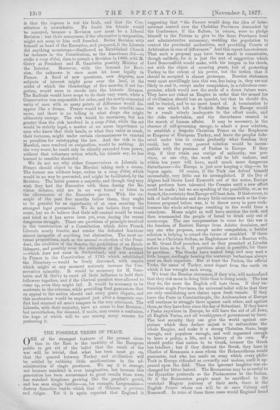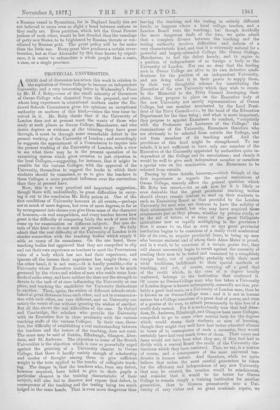THE POSSIBLE TERMS OF PEACE.
ONE of the strangest features of the present situa- tion in the East is the inability of the European public to get rid of the belief that the result of the war will be trivial, that what has been must go on, that the quarrel between Turkey and civilisation will be settled by rubbishy little ameliorations in the ad- ministration of single provinces. We say it is strange, not because mankind is ever imaginative, but because this generation has been accustomed to great results from wars, has watched kingdoms growing like the prophet's gourd, and has seen single battles—as, for example, Langensalza- destroy dynasties beside which that of Othinan is parvenu and vulgar. Yet it is again reported that England is suggesting that "the Powers would drop the idea of inter- national control over the Christian Provinces demanded by the Conference, if the Sultan, in return, were to pledge himself to the Powers to give to the three Provinces local and administrative autonomy, enabling the population to control the provincial authorities, and providing Courts of Arbitration in case of differences." And this report has credence. That such a proposal may have been made is conceivable, though unlikely, for it is just the sort of suggestion which Lord Beaconsfield would make, with his tongue in his cheek, not with the object of securing peace, but of protecting Turkey to the extent of his power, but the notion that it should be accepted is almost grotesque. Russian statesmen went most unwillingly into this war, but being in, they are not likely to end it, except under compulsion, in a ridiculous com- promise, which would sow the seeds of a dozen future wars. They have not risked an Empire in order that the armed foe of civilisation should lose an epaulet, but that he should die, and be buried, and be no more heard of. A termination to the war which left a Turkish Sultan in Europe would be a result utterly inadequate to the effort made, and the risks undertaken, and the disturbance created in the march of human affairs. It may be necessary, in the absence of self-governing energy, to admit a poor solution, to establish a despotic Christian Prince on the Bosphorus as Emperor of European Turkey, and leave the peoples fede- rated under him to obtain gradually what freedom they could, but the very poorest solution would be incom- patible with the presence of Pashas in Europe. If they stop, if they retain one vestige of authority, one pro- vince, or one city, the work will be left undone, and within ten years will have, amid much more dangerous disturbances—for Europe is just now keeping a ring—to be begun again. Of course, if the Turk can defend himself successfully, very little can be accomplished. If the Dey of Algiers had blown Lord Exmouth out of the water, Europe must perforce have tolerated the Corsairs until a new effort could be made ; but we are speaking of the possibility, or, as we deem it, the certainty that Europe will beat Asia. If that occurs, to talk of half-solutions and dreary little reforms such as the Con- ference proposed before war, is to throw away in pure reck- lessness the whole advantage resulting to the world from a cataclysm. Moses might as well have smitten the rock, and then commanded the people of Israel to drink only out of acorn-cups. The one compensation to come for this war is the freedom of Eastern Europe from Asiatic dominion, and any one who proposes, except under compulsion, a feebler solution is helping to retard the future of mankind. If there must be a Christian Sultan, an Englishman with a Russian wife, as Mr. Grant Duff preaches, and as they preached at Livadia before him, so be it. If partition alone is possible, let there be partition. The Greeks have waited long, and may wait a little longer, smilingly bearing the contempt barbarians always pour on their superiors. But at least the Pashas, the official Turks, the name of Turkey, must depart from the earth on which it has wrought such wrong. We trust the Russian statesmen, if they win, will understand that they risk more in doing little than in doing much. The less they do, the more the English will hate them. If they en- franchise single Provinces, the universal belief will be that they are only establishing new claims upon fresh vassals. If they leave the Porte in Constantinople, the Ambassadors of Europe will continue to struggle there against each other, and against them, as they have done since the day of Sebastiani. If they leave a Pasha anywhere in Europe, he will have the aid of all Jews, all English Tories, and all worshippers of government by force. The best security they can give the world against sus- picions which they declare unjust is to enfranchise the whole Empire, and make it a strong Christian State, large enough, and populous enough, and well organised enough to have a policy, a life, and a history of its own. We should prefer that nation to be Greek, because the Greek has intellect ; but if they distrust the Greek, they have in Charles of Roumania a man whom the Hohenzollerns would guarantee, and who has made an army which every philo- Turk in Europe ridiculed as cowardly and useless, until it ap- peared upon the field. Then the ignorant laughter was ex- changed for bitter hatred. The Roumanian may be as useful to the Byzantine peninsula as the Piedmontese to the Italian. Or if the Roumanian people must be sacrificed to the wretched Magyar jealousy of their serfs, there is the English Prince whose son will be at once Coburg and Romanoff. In none of these three cases would England dread
a Russian vassal in Byzantium, for in England family ties are not believed to mean even so slight a bond between nations as they really are. Even partition, which left the Great Powers jealous of each other, would be less dreaded than the vassalage of petty new States, to be frightened by Russian threats or con- ciliated by Russian gold. The great policy will be far easier than the little one. Every great blow produces a certain rever- beration, but as Czar Alexander by this time knows by experi- ence, it is easier to enfranchise a whole people than a caste, a race, or a single province.



































 Previous page
Previous page